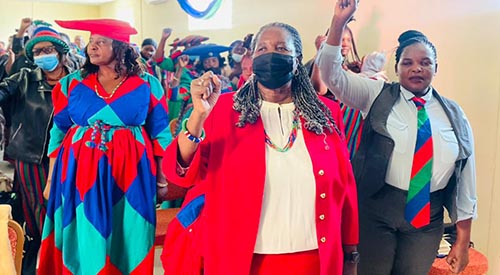Aletta Shikololo
Former Cabinet minister Pendukeni Iivula-Ithana has questioned the rationale of the 50-50 gender representation, arguing despite women’s extensive involvement in politics, they are underrepresented in high-ranking political and State-level
positions.
Speaking at the Swapo Party Women’s Council regional leadership orientation programme in Outapi last week, Iivula-Ithana said, “talking from my own experience, we have adopted the policy of 50-50 gender representation but I realised this policy is being used to downgrade the importance of
women.”
She said outspoken women leaders are targeted and replaced with “quiet and so-called nice people”, which she believes is the reason why women’s representation in “very important structures” has declined.
“For example, if a woman leader is known for saying things that others may not like, whether they are right or wrong, that person will be targeted and be replaced,” she raised.
“How do we avoid this situation of us being used as window dressers when they want to raise the issue of gender representation in politics? When they are asked about gender equality, they will point at us and say, they are there, they are there but we know there is no 50-50 in important structures,” she said.
In the National Assembly, 46 of 104 (44%) seats are held by women but only six out of 42 (14%) seats in the National Council are occupied by women. Swapo is the only party with a zebra-style representation on their candidate lists having amended its constitution in 2013 to achieve equal representation after adopting the resolution at its 2002 congress.
The first women’s quota was established in the Local Authorities Act of 1992, which stipulated that in the elections of local authority councils with 10 or fewer members, there had to be at least two women on party lists. On the lists of parties in elections to councils of 11 or more members, at least three had to be women. In 1997, these figures were increased to three and five, respectively, and in 2002 this rule was adopted as applicable to future elections.
Article 12 of the SADC Protocol on Gender and Development (2008) requires that “States parties shall endeavour that, by 2015, at least 50% of decision-making positions in the public and private sectors are held by women.
The conversation around gender disparities in politics and women leadership has come into the spotlight lately after former president Sam Nujoma told New Era that Namibia is ready for a female head of State.
The former Swapo secretary general has contested the party’s presidency twice.
Challenging gender disparities in politics
The secretary general for the National Union of Namibian Workers (NUNW), Job Muniaro, who also advocates for female leadership, said one of the reasons the majority of women are not in crucial political structures is because there is no will to groom women politically.
“We have an issue of grooming female leaders. Women have an interest in holding positions of power but the blockage of them to take part in those positions must be removed. Women must have equal treatment in terms of political grooming in order for them to take up space in positions that will require them to be voted into power,” he explained.
Muniaro believes the gap in gender balance in politics can only be bridged if the country sees a need for women to lead.
“I personally believe women will form the best leadership of this country. Taking it from the bravery during independence. In every field where there is care needed, there is the majority of women. So, they will not fail to care for this nation.”
In addition, he also said another issue that could be holding women back is betrayals and grudges among themselves.
“You want to tell me that women in this country are so disorganised that they cannot win 60% seats in parliament? Unfortunately, the wars that you have in your hearts that are only known by yourselves as women are destroying you. Stand for your rights, groom yourselves, and have the quality to lead,” he added.
The SPWC had a week-long workshop on leadership in the northern part of the country led by the council’s secretary, Fransina Kahungu.
Some of the pertinent topics discussed during the workshop included the growing and cementing of the party’s support base, ensuring free and fair elections and inter-party and inter-wing multi-sectoral coordination.
–
ashikololo@nepc.com.na
Caption 1:


